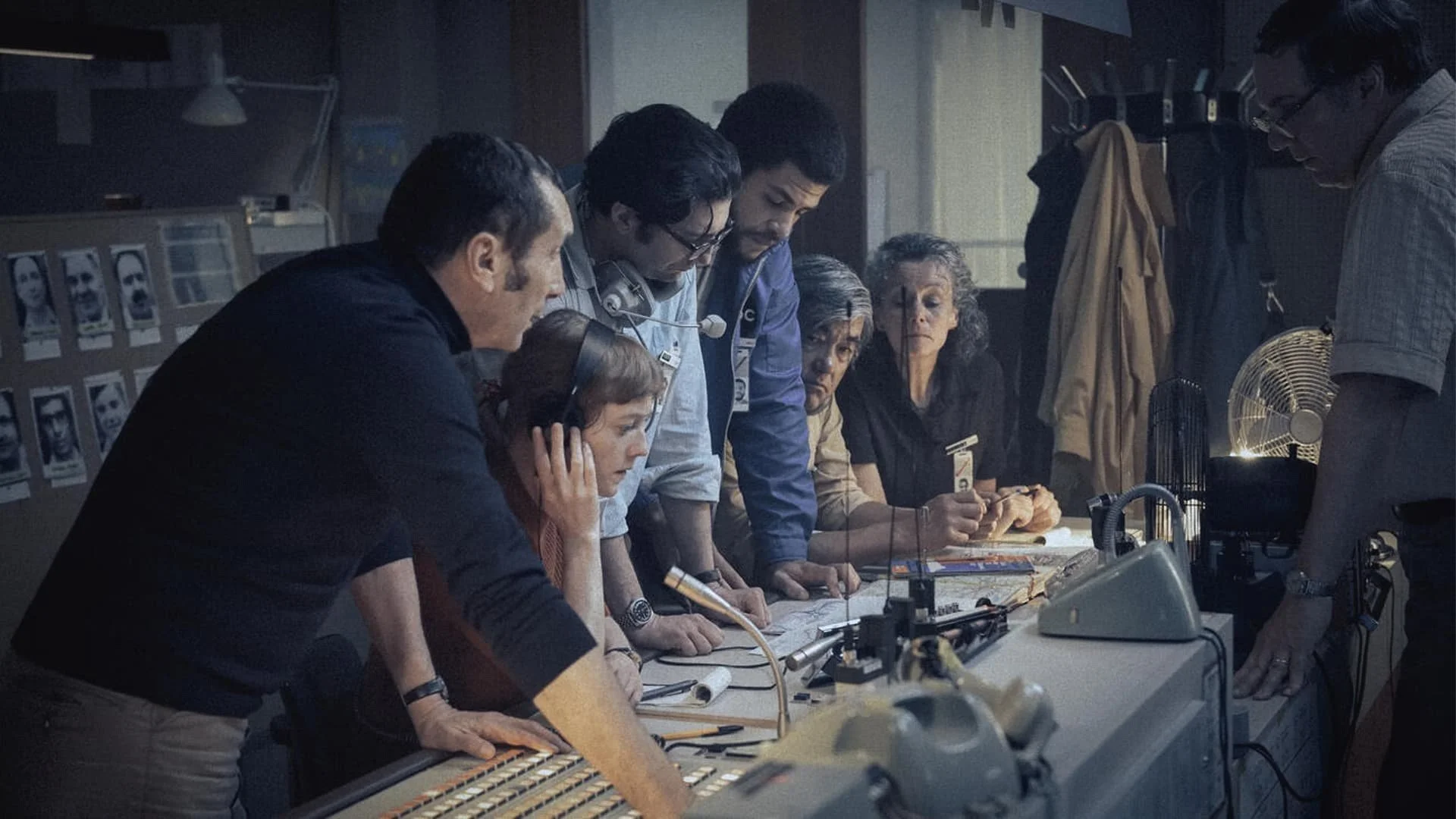September 5
As the Olympics are broadcast live for the first time, the world watches in horror as a crisis unfolds.
Broadcast news: From the far left: Zinedine Soualem, Leonie Benesch, John Magaro and Marcus Rutherford
Image courtesy of Paramount Pictures.
The timing could hardly be more incendiary. A true story about Israeli and Palestinian tensions and the taking of Israeli hostages? Here, under the auspices of the so-called Black September Organization (BSO), the Palestinians are clearly painted as the bad guys as they abduct eleven star athletes and threaten them at gunpoint. Apropos the film’s concluding caption, it was the first time an act of terrorism was shown live on television around the world, watched by a staggering 900 million viewers (more than the 1969 moon landing). The word ‘terrorism’ is mooted in Moritz Binder, Tim Fehlbaum and Alex David’s intelligent (Oscar-nominated) screenplay, while the BSO themselves preferred to be known as ‘commandos’.
The incident has been previously documented in Kevin Macdonald’s Oscar-winning One Day in September (1999) and was the jumping off point for Steven Spielberg’s gripping Munich (2005). One might argue that the subject matter has already been explored well enough, but a whole new generation might not be so familiar with the world-shattering events of 1972 in Munich, which are now more resonant than ever. Besides, there have been a slew of films about September 11, and there were four movies made about the 1976 raid in Entebbe. Here, the perspective is novel in that the story is as much about TV journalism, with the events witnessed by the Olympic nerve centre of ABC Sports.
With the 1972 Olympics being the first games to be broadcast live across the globe thanks to the innovation of satellite technology, the ABC TV personnel find themselves in a historically privileged position. And as the whole world is watching, the office staff and technicians are under particular pressure to make the transmission go as smoothly as possible. But when sport turns into breaking news, the agenda and demands on the division’s president Roone Arledge (a creditable Peter Sarsgaard) changes on a minute-by-minute basis. Is it legal to show an athlete being executed on live television? Is it a professional coup or a dereliction of morality?
Adopting a nervy, cinéma-vérité style, the Swiss filmmaker Tim Fehlbaum draws the viewer into the kinetic modus operandi of a team clearly out of its depth. Sagely, Fehlbaum plays out the action through the eyes and ears of the TV crew as its accountability to its audience and the network mutates with the actions of the terrorists. An exemplary cast of relatively unknown faces adds to the heightened sense of realism, with particularly notable contributions from John Magaro, Leonie Benesch and Georgina Rich.
Fehlbaum is not taking sides here, and the BSO remains a cadre of shadowy outsiders, their motives largely unexplored. Maybe there’s room for yet another film about September 5, permitting the Palestine Liberation Organization to exert their own reasons for securing their homeland as first documented by Herodotus in the 5th century BC. The power of cinema is that it can (and should) lend perspective to any conflict.
JAMES CAMERON-WILSON
Cast: Peter Sarsgaard, John Magaro, Ben Chaplin, Leonie Benesch, Zinedine Soualem, Georgina Rich, Corey Johnson, Marcus Rutherford, Daniel Adeosun, Benjamin Walker, Ferdinand Dörfler, Daniel Betts.
Dir Tim Fehlbaum, Pro Philipp Trauer, Thomas Wöbke, Tim Fehlbaum, Sean Penn, John Ira Palmer and John Wildermuth, Screenplay Moritz Binder, Tim Fehlbaum and Alex David, Ph Markus Förderer, Pro Des Julian R. Wagner, Ed Hansjörg Weißbrich, Music Lorenz Dangel, Costumes Leonie Zykan, Sound Frank Kruse.
BerghausWöbke Filmproduktion/Projected Picture Works/Constantin Film/Edgar Reitz Filmproduktion-Paramount Pictures.
94 mins. Germany/USA. 2024. US Rel: 17 January 2025. UK Rel: 6 February 2025. Cert. 15.



